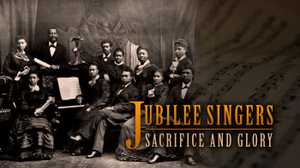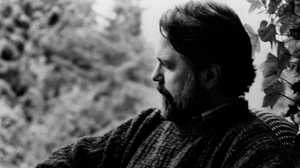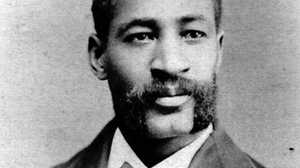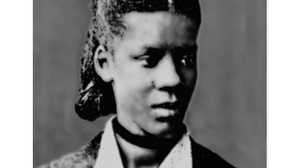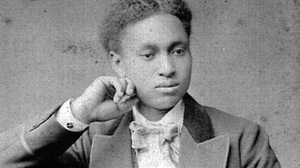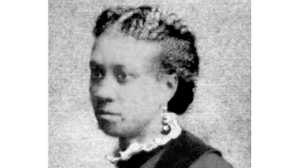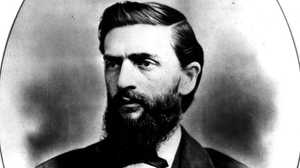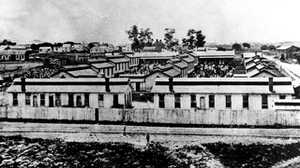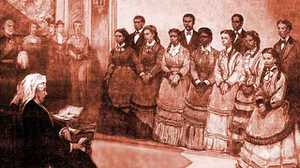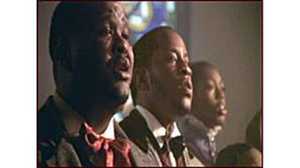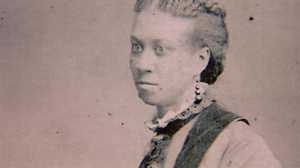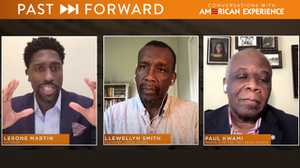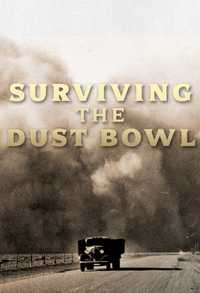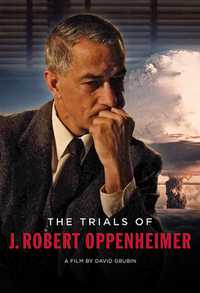WRITTEN BY
Llewellyn Smith & Andrew Ward
PRODUCED AND DIRECTED BY
Llewellyn Smith
ASSOCIATE PRODUCER
Ann Bennett
EDITED BY
Jean Boucicaut
PRINCIPAL CINEMATOGRAPHY
Michael Chin
NARRATED BY
Dion Graham
PRODUCTION ASSISTANT
Caroline Toth
ORIGINAL SCORE BY
Tom Phillips
MUSIC SUPERVISOR
Rena Kosersky
SENIOR RESEARCHER
Meredith Woods
SENIOR CREATIVE CONSULTANT
Andrew Ward
FISK UNIVERSITY ARCHIVIST
Beth Howes
RESEARCH ASSISTANTS
Sarah Shoenfeld
Lena Sheehan
Franziska Blome
Julie Rosenberg
Nzingah Clark
Margaret Kirby
Lee Shane
INTERNS
Joshua Brenner
Patrick Carey
Heather Chapman
Sara A Chaudhary
Beth Collins
Jeremy Daley
Deborah VonColln
Shannon Hodges
Andrew Rice
Emily Jansen
David Sauerwein
The 1998/99 FISK JUBILEE SINGERS
Fred Steen, Jr.
Brandon Alexander
Demetrius A. Norman
Mandisa Hundley
Vernard Burton
Rachel C. Waiters
Chikara Collins
Danita Wilson
Ayesha Porter
Paul Kwami, Director
ADVISORS
Deacon Sam McClain
Bobby L. Lovett
Toni Anderson
Horace Clarence Boyer
John Hope Franklin
Rainer Lotz
Reavis L. Mitchell, Jr
Katherine Preston
VOICES
Naheem Allah
Rosalyn Coleman
Alvin Epstein
Karen Francis
Kemp Harris
Doug Griffin
Noel Johansen
Tamara Tunie
Angela Wiggins
ADDITIONAL CINEMATOGRAPHY
Michael Chin
Bobby Shepard
Buddy Squires
ASSISTANT CAMERA
Jill Tufts
Jonathan Weaver
PRODUCTION DESIGNER
Elain Hensley
SOUND RECORDIST
Glen Trew
GRIPS
Steven Gill
Dee Nichols
GAFFER
Suzanne Carter
SECOND GAFFER
Larry Hardeker
VIDEO ENGINEER
James Royer
Mule Wrangler
Malcolm Jessup
LOCATIONS
Belle Meade Plantation, TN
Burritt Museum & Park, AL
Chi Phi Fraternity, Boston, MA
Susan Mitchell Hardt Residence, MA
Colonial Theater, MA
Duke University, NC
Fisk University, TN
Grace Episcopal Church, TN
Great Brook Farm State Park, MA
Mount Auburn Cemetery, MA
Massachusetts Historical Society
Nashville Wildlife Park-Grassmere, TN
Travellers Rest Historic House Museum, Inc., TN
Tremont Temple, MA
PHOTO ANIMATION
Berle Cherney,
Visual Productions
FILM PROCESSING
Medallion PFA Film and Video
ON-LINE EDITORS
Ed Ham
Lorraine Grant
SOUND MIX
Heartpunch Studios
SOUND RECORDING
RMR STUDIOS
Archival Footage Provided By:
Blue Sky Stock Footage
John E. Allen
Library of Congress Paper and Print Collection
Archival Stills Provided By:
AKG Photo
American Antiquarian Society
Andover Theological Library, Harvard University
Archive Photo
Boston Public Library
The Bostonian Society
Brooklyn Public Library
Chicago Historical Society
Corbis Images
Delaware Public Archives
Fisk University Archives, Nashville, Tennessee
Fisk University Galleries, Nashville, Tennessee
Greg French
Lamont Library, Harvard University
Liaison Agency, Inc.
Library of Congress
The Museum of The City of New York
New Jersey Historical Society
North Wind Picture Archives, Alfred, Maine
Oberlin College Archives, Oberlin, Ohio
Ohio Historical Society
Oxfordshire County Council, Central Library, Londo
n Pusey Map Collection, Harvard University
Rijks Museum, Amsterdam
Schomburg Center for Research in Black Culture, The New York Public Library
Shaw University Archives and Special Collections
Tennessee State Museum
Tennessee State Library and Archives
Valentine Museum, Richmond, Virginia
Widener Library, Harvard University
William Gladstone Collection
Yale University Library, New Haven, Connecticut
SPECIAL THANKS
Steve Bass
Beth Curley
Carol Cornsilk
Tracey McEvoy
Caroline Martin
Alice Abraham
Ronald E. Butchart
Philip Derendorf
Jenna Goodearl
Cynthia & Virgil Griffiths
Marguerite Hicks
Taylor Owens Hicks
Nathan Kennedy
Eileen Mency
Jeff Nelson
Robert Poole
Joe Richardson
Doug Siroff
Jim Standifer
Marilyn Tomlinson
Mario Valdes
American Repertory Theatre
Boston African American National Historic Site
Boston National Historic Park
Brattle Book Shop
Cambridge Antiques Market
Center for Black Music Research
Costume Holiday House
Encore Theatrics
MIT Theater Arts Costume Shop
Performance Costume Rentals
Sadye & Company
Tennessee Repertory Theater
Trinity Repertory Theater
Huntsville Hilton
Alabama Film Office-Center for Commerce
Courtney Murphy
Nashville Mayor's Office of Film
Kym Gerlock Jackson, Director
Niki Arthur
FOR THE AMERICAN EXPERIENCE
On-Air Promotion
Frank Capria
James Dunford
Post Production
Maureen Barden
Raymond Powell
Field Production
Larry LeCain
Bob McCausland
Chas Norton
Bob Thompkins
Series Designers
Alison Kennedy
Chris Pullman
Title Animation
Lizard Lounge Graphics, Inc.
Online Editor
Mark Steele
Series Theme
Charles Kuskin
Series Theme ADAPTATION
Michael Bacon
BUSINESS Manager
Christine Larson
Project Administration
Nancy Farrell
Helen R. Russell
Andre Jones
Rebecca Suggs
Interactive Media
Rick Groleau
Danielle Dell'Olio
Publicity
Daphne B. Noyes
Johanna Baker
Coordinating Producer
Susan Mottau
Series Editor
Joseph Tovares
Senior Producer
Mark Samels
Executive Producer
Margaret Drain
A production of WGBH Boston For The American Experience
Produced with the assistance of Nashville Public Television
©2000 WGBH Educational Foundation All rights reserved
Jubilee Singers: Sacrifice and Glory
Film Description
On November 16, 1871, a group of unknown singers — all but two of them former slaves and many of them still in their teens -- arrived at Oberlin College in Ohio to perform before a national convention of influential ministers. After a few standard ballads, the chorus began to sing spirituals -- "Steal Away" and other songs" associated with slavery and the dark past, sacred to our parents," as soprano Ella Sheppard recalled. It was one of the first public performances of the secret music African Americans had sung in fields and behind closed doors.
"Jubilee Singers: Sacrifice and Glory," produced by Llewellyn Smith, tells the story of a group of former slaves who battled prejudice and oppression to sing their way into a nation’s heart. Eventually, they would perform for presidents and queens, tour the United States and Europe, and establish songs like "Swing Low, Sweet Chariot" and "This Little Light of Mine" as a cherished part of the nation’s musical heritage. The program features today’s Fisk Jubilee Singers performing these and many other spirituals; Dion Graham narrates.
The concert in Oberlin was the turning point in a daring fundraising experiment for impoverished Fisk University in Nashville, Tennessee, where the singers were students. Established in January 1866, Fisk taught freed slaves how to count their wages, how to write the new names they had chosen for themselves, and read both the ballot and the Bible. Despite emancipation, the South was a dangerous place: Fisk students who dared teach in the countryside were routinely assaulted and whipped by Ku Klux Klan nightriders; one was shot at in his classroom; another had her school building burned to the ground.
Charged with keeping the financially troubled school afloat, treasurer George Leonard White proposed taking Fisk’s most gifted singers on a fundraising tour of the North. Before they even left town, they encountered resistance: the parents were afraid to let their children go; White’s fellow teachers opposed the tour; and the American Missionary Association, the northern religious organization that operated Fisk, refused to help, worried that the chorus’s appeal for funds would jeopardize their own fundraising activities. But White persevered.
Following the path of the Underground Railway, the group made its debut in Cincinnati. Despite the warm reception, donations totaled less than $50. Night after night, it was the same: crowds loved their singing, but the collection plate yielded barely enough to cover their expenses. Yet no one turned back.
Life on the road took its toll. White and the singers endured rheumatism, bronchitis, chronic coughs. Their clothes ran to rags. But after the triumphant Oberlin performance, word started to spread. In December, the Jubilee Singers appeared at Henry Ward Beecher’s weekly prayer meeting at Brooklyn’s Plymouth Church. "Every church wanted the Jubilee Singers from that time on," wrote Maggie Porter. They sang for Mark Twain, President Ulysses S. Grant, congressmen, diplomats.
After less than two weeks’ rest, the singers were back on the road, touring the Eastern United States. Eventually they would tour Europe to universal acclaim and sing for the royal families of Holland, Germany, and Britain.
The group raised what today would be millions of dollars, but they paid a terrible price. Worn down by the relentless schedule, an advance man suffered a nervous breakdown. George White lost his wife to typhoid fever. White himself nearly died of a pulmonary hemorrhage. Contralto Minnie Tate’s voice was torn to shreds. Tenor Benjamin Holmes’s nagging cough was caused by tuberculosis. They faced discrimination on the road and from the press. A grueling tour of Germany -- ninety-eight days, forty-one towns, sixty-eight concerts -- brought with it low morale, frayed nerves, and rivalries among the singers.
After almost seven years of touring, the Jubilee Singers returned home. They were honored by Fisk for raising the funds to complete Jubilee Hall and save their school.
But their contributions extended far beyond Fisk University. They had introduced the world to the power of spirituals and challenged racial stereotypes on two continents. "In their wake, hotels, railways, steamship lines, and boards of education integrated their facilities. The Jubilees not only introduced the world to the music of black America, they championed the liberties of all Americans," says Andrew Ward, co-writer of the documentary and author of "Dark Midnight When I Rise: The Story of the Jubilee Singers." More than 125 years later, the Jubilee Singers of Fisk University continue the concert tradition begun by that courageous original chorus of former slaves.
Credits
Transcript
DAVID MCCULLOUGH, Series Host: Hello and welcome to The American Experience. I'm David McCullough.
Courage is a powerful, old theme in the story of America... the courage to cross great oceans for the chance of a better life... the courage to defy tyranny... or to stand up for one's convictions...
Our film is about nine very courageous and gifted young Americans who in 1871, six years after the Civil War, set off from Nashville, Tennessee, not to cross the Rockies or sail round the Horn, but to save a failing university that meant everything to them. They were the Jubilee Singers from Fisk University heading north on a first tour. All but two were former slaves, several were still in their teens. They had no money, no reputation, no experience performing on the road, and the ridicule and menace they faced, because of their color, were all too real in a land where, by then, everybody supposedly had equal rights.
Their strength was in their faith -- faith in God, faith in education, and in the transcendent spirit in the old songs they sang, "cabin songs," from slave times.
"Swing Low Sweet Chariot," "Steal Away," "Were You There When They Crucified My Lord." The Jubilee Singers were the first to perform these songs before white audiences. It was music to touch the hearts and souls of all men and women everywhere. And there would come the moment at historic Plymouth Church in Brooklyn, when suddenly the power of their message became evident as never before.
Jubilee Singers: Sacrifice and Glory by producer Llewellyn Smith and co-written by Andrew Ward.
DEACON SAM MCCLAIN:
Couldn’t hear nobody pray.
I was way down yonder
By myself
And I couldn’t hear nobody pray
NARRATOR: In 1855, a Tennessee slave named Sarah Hannah Sheppard discovered that her daughter Ella had been trained to spy on her by their white mistress. Tormented, despairing, Sarah set off to drown her little girl, then herself. But providence intervened, in the form of an old slave woman.
Ella Sheppard
Song: "Swing Low Sweet Chariot"
NARRATOR: Ella would fulfill the prophecy in a way Sarah never imagined -- through Sarah’s own songs of sorrow and redemption. One day Ella would perform them in palaces, cathedrals, and concert halls with a choir of emancipated slaves. And build a great university out of the sacred songs of Jubilee.
Ella Sheppard’s father purchased her out of bondage and fled with her to Ohio, where she learned to read and write, and play the piano.
At end of the Civil War, she returned to Tennessee. Determined to become a teacher, she enrolled at a struggling school for freed blacks in Nashville, named Fisk University.
Fisk was a university in name only: a freedman's school, established in an abandoned army hospital barracks. Fisk was dedicated to training men and women like Ella to educate African Americans across the South. The school was run by the American Missionary Association, called the A.M.A. Fisk’s treasurer was a zealous missionary from New York named George Leonard White: a Union veteran of Gettysburg and Chancellorsville.
White's job was to keep Fisk afloat. But he had been a choir master and a band sergeant, and his true passion was music. Entranced by the beautiful voices of the young former slaves who studied at the school, he began to assemble the most gifted into a chorus.
Ella Sheppard
NARRATOR: In Ella Sheppard, George White recognized someone whose passion for music matched his own. White appointed Sheppard assistant choir director, making her, at age 18, the school's first black instructor.
Together, White and Sheppard rehearsed the student chorus in popular songs of the day, and musical pageants like the "Cantata of Esther."
But White was most entranced by the mysterious, moving songs that Ella Sheppard and the students sang for themselves. They were called cabin songs, plantation melodies, spirituals and Jubilees: folk hymns composed by slaves for worship and solace.
HORACE BOYER, Musicologist: You start singing a song, and when you’re singing it first, according to the slaves, you’re just singing the words. But after a while, its almost like therapy. It begins to take the frown out of the face. The shoulders begin to come back to their natural position, what’s happening is you’re going through a cleansing process. These people were not readers. They were not writers. They had to sing songs with a few words, that they could learn once, carry on forever, that everybody could sing at the same time. So your going to find spirituals that will say, "Swing low, sweet chariot, coming for to carry me home. Swing low sweet chariot, coming for to carry me home." Just a few words which are going to be sung over and over.
NARRATOR: But education, not music, was the purpose of schools like Fisk University.
Under slavery, reading and writing had been forbidden, punishable by whipping, imprisonment or worse. With emancipation, waves of freedmen descended on any school they could find, desperate to learn how to count their new wages, write the new names they had chosen themselves, read the ballot and the Bible.
When Fisk opened its doors in January of 1866, hundreds of former slaves crowded into day school and night classes at the school's barracks.
But the school was continually on the verge of financial collapse. By 1868, it couldn’t pay its creditors, or even its teachers. One instructor apologized for asking for her back pay; but it was cold, she said, and she had no shoes.
Tuition was twelve dollars a year at a time when farm laborers earned as little as eight dollars a month.
As treasurer, George White put up his own savings to keep the school afloat. To collect unpaid tuitions, he wrote letter after letter to already hard-pressed parents.
George White
Rachel Ferguson
NARRATOR: When students uncovered rusty chains from an abandoned slave pen, White sold the chains for scrap iron to buy Bibles and spellers. To raise more money, White led his choir to neighboring towns to sing for donations, despite the dangers.
JOHN HOPE FRANKLIN, Historian: There was no lacking of opposition to the establishment and maintenance of schools for the freedmen. People who had subscribed to the view that (1) blacks were inferior, they were childlike, they were irresponsible, could not believe that energy and resources should be expended on the training of people who could not absorb the training anyway. After all there's talk about their becoming voters and full citizens, especially in 1866 and 1867. And you've got to put a stop to this.
NARRATOR: Nightriders like the Ku Klux Klan assaulted and whipped Fisk students for teaching in the countryside. A young choir member, Benjamin Holmes, was shot at in his classroom. And soprano Maggie Porter returned one New Year's to find that local whites had celebrated the holidays by burning her school to the ground.
Song: "Were You There?"
NARRATOR: One evening White and his singers found themselves stranded at a railway depot in a small town and surrounded by a jeering mob.
Ella Sheppard
DEACON SAM MCCLAIN: "In Times Like These."
NARRATOR: By 1871, Fisk's barracks were rotting away.
Ella Sheppard
NARRATOR: That fall George White seized on a daring plan. He proposed to take his singers on a fund raising tour of the North. White believed his young students were convincing proof of what higher education could do for the freedmen. By October, White and Ella Sheppard had assembled and rehearsed their best singers. All but two had been slaves.
Tenor Thomas Rutling, a former house slave was almost expelled from Fisk for passing notes to female students. One newspaper deemed him the best tenor in Tennessee.
Benjamin Holmes, 23, survived his semester of countryside teaching. As a slave he'd secretly taught himself to read and was now a deacon of Fisk’s chapel. Like Holmes, 18-year-old Maggie Porter had continued to teach in country schools, uncowed by threats and arson.
Twenty-one-year-old baritone Isaac Dickerson had been a Confederate colonel's valet in the war.
Soprano Jennie Jackson, age 19, was a granddaughter of President Andrew Jackson’s body servant.
Youngest of the nine singers was 14-year-old contralto, Minnie Tate, who as a free girl had been taken in by German settlers.
The parents of White's singers were afraid to let their children go. Fearing ridicule, even disgrace, his fellow teachers opposed the tour. And the American Missionary Association refused to help.
TONI ANDERSON, Music Historian: George White wanted to target mainly white Christian audience. And generally the audiences he was going to be searching for were the same audiences the A.M.A. already appealed to support. But there's even more to it than that. Black singers did not appear on stage during this era, except in the minstrel show. And the minstrel show was a very stereotypical and derogatory image of African Americans. Good upstanding Christian people did not go to these kinds of entertainments.
NARRATOR: Many freedman schools had already been crushed by debt and violence. White was convinced that he and his singers had been chosen by God to save Fisk.
"Tis time to root, hog, or die," he wired the A.M.A. "I’m depending on God, not you."
With the last $40 of the school's treasury in his pocket, White took his singers on the road.
Ella Sheppard
DEACON SAM MCCLAIN: Oh, if I got my ticket, can I ride? Oh, if I got my ticket, can I ride? Tell me, if I got my ticket, can I ride, Ride away to Heaven in the morning...
NARRATOR: White's plan was to lead his singers North to perform along the old Underground Railway, starting in Cincinnati and following the network of abolitionist homes and churches that had once relayed escaped slaves to Canada. For their repertoire, White chose European classical and popular songs, some composed by himself.
At their debut in Cincinnati, the audience received them warmly enough, but donated less than fifty dollars. The next day news reached the singers of the great fire in Chicago. They gave all their money to the relief fund, and left town empty handed.
Night after night, it was the same story: Crowds loved their singing, but the collection plate said it all: $50 or $60, barely enough to cover their expenses.
KATHERINE PRESTON, Music Historian: You were staying in flophouses or in boarding houses. You could get your meals there. The meals were nothing to write home about. The rooms were generally dirty. They were not well kept. The vaudevillians of this period refer to them as "don't look under the bed rooms." There was probably bugs in the beds. There were probably rats around. There were always signs in the railroad stations saying, "Nigger read and run"and sometimes there'd be below the sign scratched on, "And if you can't read, run anyway."
NARRATOR: But no one turned back. "All we wanted," recalled soprano Maggie Porter, "was for Fisk to stand."
BOYER: If the singers don't bring back some money the school is going to fold. And so that the singers were having to sing at every opportunity. Sometimes they would sing in churches. They would sing for private parties. They would sing for teas. Sometimes they would ask them to stand on a busy thoroughfare.
Ella Sheppard
NARRATOR: The grueling logistics of the failing tour were George White's burden.
ANDERSON: Many times he would have to leave Ella Sheppard with the students, with the rest of the singers to get ready for the next concert, while he went ahead to the next city. There he would have to secure a hall, talk with all of the ministers in the area to try to drum up support, build an audience, advertise he would have to leave the students at the station because no hotel would take them in, and go up and down the streets, knocking on doors to try to find Christian people who would house the singers overnight.
Benjamin Holmes
Song: "You may bury me in the East...I'll hear the trumpet sound."
NARRATOR: Week after week, performing with little rest, White and the singers endured rheumatism, coughing fits, bronchitis,. Their clothes ran to rags. Sickly Ella Sheppard begged White to send her home. But White refused. He had begun to experiment with the singers’ repertoire, and now needed Sheppard more than ever.
ANDERSON: Initially they would have maybe seventeen numbers that were quote white man's music, and they would include some spirituals often as encores. But when they saw how those spirituals were received, they began to include more and more spirituals. They arranged them while they are on tour. And that responsibility fell to Ella Sheppard. So here's Ella Sheppard, drilling the singers, arranging new melodies, teaching them, practicing the spirituals, all during the time they're concertizing, night after night after night. It's incredible.
Ella Sheppard
NARRATOR: On the 16th of November, the weary singers arrived at Oberlin College in Ohio, to sing before a national convention of influential ministers. This time, they reached past cantatas and ballads, back to the secret music they'd sung behind closed doors: the sacred songs of their mothers and fathers.
Fisk Jubilee Singers’ rendition of "Steal Away."
BOYER: They started singing " Steal Away." And all of a sudden there was no talking. And then they said that you could hear soft weeping and the faces of the people reddened. And I'm sure that the Jubilee singers were joining them in tears, because sometimes when you think about what you are singing, particularly if you believe it, you can't help but be moved.
NARRATOR: After their small triumph at Oberlin, word spread from congregation to congregation. Letters and telegrams flew ahead of them, urging other small town churches to open their doors.
Yet the singers still needed a name. After a night of prayer, George White had an inspiration. "Children," he told the troop, " it shall be -- Jubilee Singers."
ANDERSON: The name was taken from Chapter 25 of Leviticus, from the Bible, after the Jewish year of Jubilee. The Jewish Year of the Jubilee occurred every fiftieth year, and in the year of Jubilee were provisions for debt relief, provisions for redemption of property and for emancipation of slavery.
NARRATOR: That winter White rushed to add more spirituals to the repertoire. Jennie Jackson brought him "I’ll Hear the Trumpet Sound." Ella Sheppard taught White her mother’s favorite lullaby, "Swing Low Sweet Chariot."
When the Fisk students reached New York in December, it was make or break. Three days before Christmas, Henry Ward Beecher, the most famous preacher in America, had invited them to sing at his weekly prayer meeting.
Beecher’s Plymouth Church in Brooklyn included some of America’s richest and most influential families. If the singers failed here, they wouldn't even have enough money to get back to Nashville.
Song: "Rockin' Jerusalem?"
Reading: Henry Ward Beecher was on his feet, and with his hands in his pockets he brought out five dollars and told everybody to follow suit. That was our start. Every church wanted the Jubilee Singers to sing for them ...from that time on..."Maggie Porter
NARRATOR: Even the American Missionary Association dropped its opposition and scrambled to get on board. It would now take five of their agents, full-time, to accomplish what White and Sheppard had been doing on their own.
Touring Connecticut they brought in a phenomenal $1200 a week. In New Haven and Hartford hundreds of new fans were turned away.
"I don’t know when anything has so moved me," wrote Mark Twain, " as did the plaintive melodies of the Jubilee Singers."
In Washington they delighted President Ulysses S. Grant and a concert hall filled with congressmen and diplomats.
"If the Great Book were destroyed today," wrote one reviewer, "it could be re-created out of the fabric of these very songs."
Song: "Great Camp Meeting in the Promised Land"
NARRATOR: Now when the Jubilees encountered Northern racism, protests often followed. When the singers were later refused accommodations on Pullman cars, George Pullman integrated the cars himself, and they stayed integrated for another quarter century.
When a New Jersey hotel manager threw them out after realizing they were not "black-face" minstrels, leading citizens took them in. And an embarrassed Board of Education opened its schools to black children, for the first time.
"These singers," wrote one newspaper, "are doing a great work for humanity. They are, by their sweet songs, molding and manufacturing public sentiment. "
Ella Sheppard
NARRATOR: They returned to a school under siege. In Nashville as in many Southern cities, Northern troops stood guard against vigilantes. The new university President, Erastus Milo Cravath, was determined to oppose white hostility by making Fisk a Southern showcase.
He set out to build Jubilee Hall, a grand edifice to capture the imagination of donors, and frustrate the torches of the Ku Klux Klan.
REAVIS L. MITCHELL, Historian: By 1873-74 in the South there was a series of fires, and many of those places identified as schools for the former slaves come under the torch. But Jubilee Hall will stand as a mighty structure with walls more than 12 inches thick, of stone and brick. It would be adorned by a bell tower, which can also serve as a watchtower.
NARRATOR: Building Jubilee Hall was going to take a lot more money. After less than two weeks’ rest, Sheppard and White reorganized the Jubilee Singers and took them back on the road. Now they were paid professionals, supporting a large entourage of managers, matrons, tutors and advance men.
Song: "The Battle Hymn of the Republic." Glory, glory, hallelujah, Glory, Glory hallelujah, Glory, Glory, hallelujah, His truth is marching on.
NARRATOR: In June of 1873, at Boston's World's Peace Jubilee, the Singers were called on to make themselves heard over a one-thousand-piece orchestra, a chorus of ten thousand, and a battery of cannons in a colossal performance of "The Battle Hymn of the Republic."
Georgia Gordon
Franklin: They were representing a new freedman, a new kind of black person. The dignity, the carriage, the voice, and the articulateness of these young people surprised large numbers of northerners
NARRATOR: Not every Northerner was won over. "The New York World" called them "trained monkeys" who sang "with a wild darkey air." "The Newark Evening Courier" listed them as if they were items from a slave dealer’s catalogue. In Baltimore, a ticket seller refused to sell the singers admission to their own concert.
And there was more. Other black schools began their own choirs. Hucksters passed themselves off as the original Jubilee Singers. All this further popularized the spirituals, but cut into the Jubilees’ receipts. The singers were forced to seek out new fields for harvest -- thousands of miles from home.
In April 1873, they set sail for the British Isles.
Only one day after their London debut, the singers were astonished to find themselves performing before none other than Queen Victoria herself.
Maggie Porter
NARRATOR: "They are real Negroes," wrote the Queen in her journal that night-- "come from America & have been slaves. They sing extremely well together." The Queen’s pleasure opened every door. Prime Minister Gladstone, The Prince of Wales, dukes, duchesses and earls were transfixed by their songs. And the singers were quickly embraced by evangelicals crusading to save British souls.
At Reverend Charles Spurgeon’s vast Tabernacle, they sang to a congregation of 6,000.
Across England, Scotland and Ireland, they were a phenomenon. Books and newspapers chronicled their rise from slavery. At concert after concert their portraits and songbooks sold out to British fans.
Thomas Rutling and Isaac Dickerson left behind a string of broken hearts.
MITCHELL: These young people are perfect Victorians. They are dressed in Victorian elegance. They deport themselves in a very Victorian manner. Remember, the world was not accustomed to looking at black Victorians. This may be the inspiration as much as the songs and the music, for Queen Victoria to allow her portrait painter to paint a beautiful Victorian portrait of these young Jubilee Singers NARRATOR: The British were fascinated by their color. They said Mabel Lewis and Georgia Gordon could pass as English belles, and Minnie Tate as coming from the south of France. Dark-complexioned Jennie Jackson was most sought out of all.
Mabel Lewis
NARRATOR: Mabel Lewis enjoyed teasing her fans.
Mabel Lewis
NARRATOR: In the spring of 1874, the Jubilee Singers returned home in triumph with another $50,000 for the construction of Jubilee Hall. "No one can estimate the vast amount of prejudice which has perished under the spell of their marvelous music," declared the Board of Trustees. "Wherever they have gone they have proclaimed to the hearts of men the brotherhood of the race." DEACON SAM MCCLAIN sings: In times like these, yes Oh, in times like these. In times like these I need the Lord to help me. When I’m burdened down,
NARRATOR: But success in England had come at a price. Worn down by a relentless schedule, an advance man suffered a nervous breakdown. DEACON SAM MCCLAIN continues: When I’m burdened down, When I’m burdened down, When I’m burdened down. Oh, I need the Lord to help me.
NARRATOR: Typhoid fever carried away George White’s wife. White himself nearly died of a pulmonary hemorrhage.
Contralto Minnie Tate had sung her voice to shreds. And the nagging cough Benjamin Holmes had urged friends not to worry about turned out to be tuberculosis. Throughout Tennessee and the rest of the South the hopes of African Americans were being dashed. The Freedmen’s Bureau, established by Congress to enforce the rights of emancipated slaves, had been abolished. Federal troops that had once protected African Americans were gone. Many black schools shut down.
Former Confederates took over legislatures and began to replace laws protecting black rights with new segregation codes.
And despite all the singers had sacrificed, Jubilee Hall was still only a hole in the ground. Fisk’s President Cravath knew this was because the A.M.A. had been borrowing heavily from the Jubilee Hall fund to stave off its own bankruptcy.
Cravath was anxious to get the singers back on the road not just to build up Fisk and Jubilee Hall but to rescue the overextended A.M.A.
Reminding them of their evangelical mission, Cravath prevailed on the exhausted Jubilees to embark on yet a third tour.
In January 1875, George White and Ella Sheppard organized a new troupe of singers. Ella and Thomas Rutling, Maggie Porter and Jennie Jackson were the only original Jubilees left.
Among the newcomers was America Robinson, a Fisk student engaged to a classmate, James Burrus.
America Robinson
NARRATOR: After long tours of America and Britain, the Jubilees traveled to Switzerland and Holland to test the universality of their music.
Arriving in Amsterdam in the winter of 1877, the singers were mobbed by adoring fans.
Ella Sheppard
NARRATOR: They performed for the Queen of the Netherlands and raised another $10,000. But the non-stop schedule was wearing out George White and the singers.
Boyer: The voice is the one thing we can’t camouflage. We can’t put makeup on the voice and have it come out a different way. So if you have a cold, if you’re tired, if you’re hungry, all of these things come out in the voice.
PRESTON: So you have not only the physicality of singing and the—the—the problems of dealing with—with working on stage, but you have on top of all that the whole issue of the pressure that these kids are under to prove a point.
The point is that African Americans are educable people, that they are people who can gain from a college education. Many people didn’t believe that.
NARRATOR: That summer White asked Cravath to come help manage the troupe. He got more than he bargained for. Cravath had no musical training. But he had big plans starting with an ambitious tour of Germany, birthplace of Bach, Beethoven, and Brahms. White was against it. "...I know what is necessary to win musical success in Germany," White argued, "but I see no chance at all to accomplish it." But in the end, the Jubiläums-Sanger were a popular and critical sensation.
"The Berliner Musik Zeitung"
NARRATOR: Even when the Germans did not understand the words they cried and smiled at the same places as English audiences had. At Potsdam, they sang for Kaiser Wilhelm the First. As the Jubilees sang, Crown Princess Victoria, daughter of Queen Victoria of England, burst into tears.
Ella Sheppard
NARRATOR: "These songs, as you sing them, go to the heart," explained the Crown Prince. "They go through and through one."
In later years many of the singers would remember these concerts as the crowning triumph of their careers. But this was soon overshadowed by news from home. With conditions worsening in the Tennessee countryside, hundreds of African Americans were fleeing to the cities for refuge, cramming into slums. Epidemics were rampant.
Tuberculosis claimed three Fisk students, among them the Jubilees’ old friend and colleague, Benjamin Holmes. "We were all quite prepared for his death," wrote America Robinson, "but we all felt it deeply. Everybody loved Mr. Holmes.
They traveled from Berlin to Magdeburg, Magdeburg to Leipzig -- on and on through Germany. An astonishing 68 concerts in 41 towns, in ninety-eight days -- not including impromptu performances in churches, trains, and private homes. Many nights only six out of eleven were well enough to perform. Ella Sheppard collapsed and was sent to Holland to recuperate. Then Julia Jackson suffered a stroke.
America Robinson
NARRATOR: A new baritone named Frederick Loudin blamed Cravath.
Frederick Loudin
NARRATOR: These were no longer the wide-eyed teenagers who had set out six years before. Most were now well into their twenties. Almost every one of them had been offered opportunities to study at British universities, perform for rival groups or even strike out on their own. And they knew their own worth. More and more they demanded a a say in how the troupe would be managed.
ANDERSON: George White was used to running the group and giving clear directions, and mandating how things were going to go. But as the membership and the group evolved and became a professional organization, the individual members had ideas equally about how things should go. And they often clashed with George White.
NARRATOR: After a six-week recovery from near-fatal pneumonia, Ella Sheppard rejoined the singers in Germany to find chaos. George White, worn out from illness, railed at the singers he still called his "children," and submitted his resignation. To Sheppard’s horror, Cravath accepted it. He was already planning tours of Australia, South America and the American West. To keep the troupe alive, Cravath asked Sheppard to take over from White.
After prayer, Ella agreed on the sole condition that she and the exhausted Jubilees return to Nashville at the end of their current engagements. There would be no new bookings. Cravath called her a deserter.
NARRATOR: Ella stood her ground. She directed the troupe for the three contentious months it took to finish their engagements. Even Cravath could see that it was time. Rivalries among the singers had become open. Morale was low, nerves were frayed. After almost seven years of touring, [singing night after night,] the Jubilee Singers had had enough.
Song: "Steal Away."
NARRATOR: At long last, the singers started for home. As their ship approached American waters, they sang together one last time.
Ella Sheppard
Franklin: The contrast between the world that the Jubilee Singers left and the world to which they will return is considerable.
They had been wined and dined and lionized and praised all over the North and all over Europe. and had seen how a human being could live. Bad for them to come back to a world that has deteriorated even since they left. (12:33)
NARRATOR: Some never did come back. Thomas Rutling and Isaac Dickerson refused to set foot in America, and eventually died in England.
The years of touring reduced George White to an invalid. Like Benjamin Holmes, he died of consumption. At his memorial service in 1895, a few of the Jubilees returned to sing his favorite spiritual, "Steal Away."
The singers who returned to Nashville were honored by Fisk for raising over one hundred and sixty-thousand dollars to complete Jubilee Hall, and save their school.
But as emissaries of the freedmen, their contributions extended far beyond Fisk University. They had introduced the world to the sacred hymns of their ancestors.
Song: "Ain't Got Time To Die"
NARRATOR: Ella Sheppard eventually returned to Fisk to be the teacher that she had wanted to become when she first arrived in 1868.
By the time of her death at the age of 63, she had become one of the most respected women of her day: a confidante of Frederick Douglass and Booker T. Washington.
And Sarah Hannah Sheppard, the mother who had once tried to drown Ella and herself rather than live in bondage, lived out her life in her daughter’s house, witness to the fulfillment of a prophecy made back in the days of their bondage, under the clouds of the Lord.
CAPTION: The Fisk Jubilee Singers still continue the concert tradition of the Negro spiritual.
